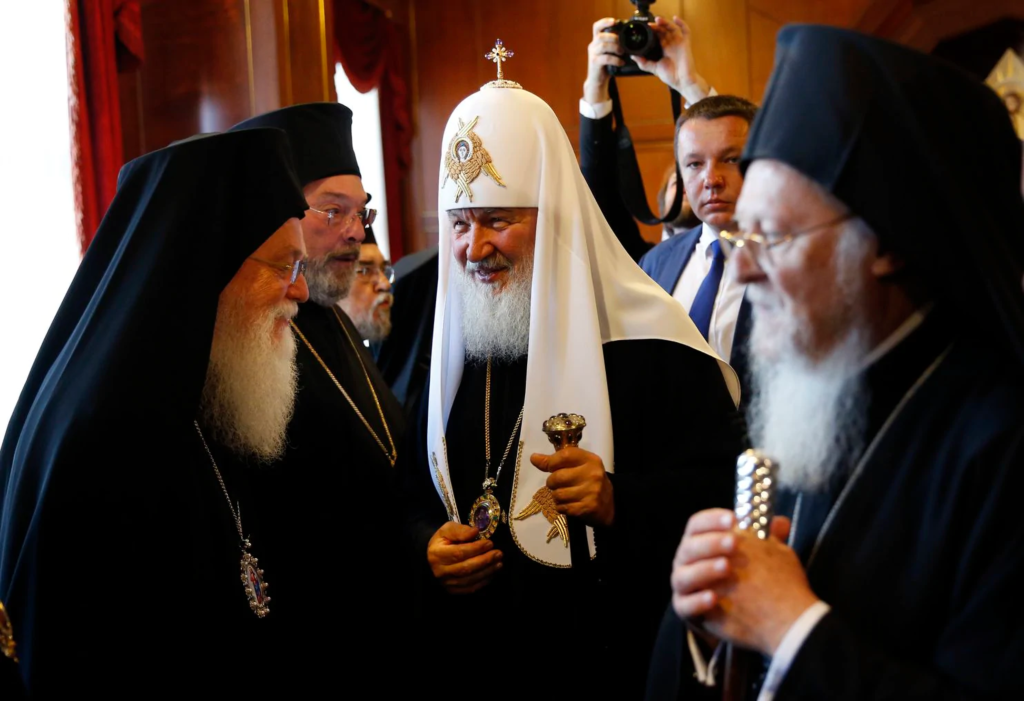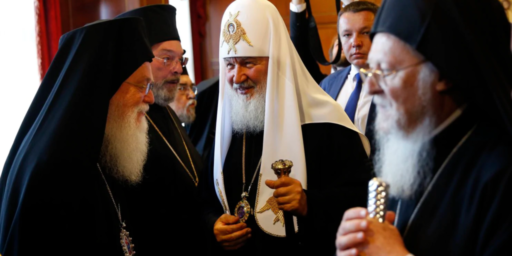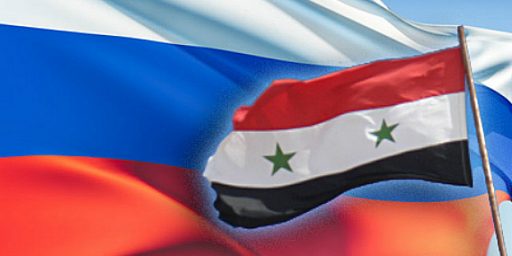Eastern Orthodox Schism Grows Wider
The dispute over Ukraine between the Russian Orthodox Church and the Orthodox Patriarch is widening and nearing the point of a complete break.

Further complicating a situation that has implications not just for religion but also for the simmering conflict between Russia and Ukraine, the Russian Orthodox Church took steps this week to sever ties with the Orthodox Church in Greece over the decision to grant autonomy to Ukraine’s Orthodox Church:
The Russian Orthodox Church on Monday moved to sever all ties with the Constantinople Patriarchate, the Orthodox mother church, to protest its moves toward creating an independent church in Ukraine.
The decision taken by the hierarchy of the Russian church barred all its adherents from taking part in rituals like communion, baptism and marriage at any church worldwide controlled by the Patriarchate.
“We hope that common sense prevails, that the patriarch of Constantinople changes his attitude to the existing church reality,” Metropolitan Hilarion of Volokolamsk, the head of foreign relations for the Russian church, said in announcing the decision after a synod in Minsk, Belarus.
The decision was another step down the road toward one of the most serious schisms in Christianity for centuries. The move stopped short of a complete break, however, with the Russian church calling on the leaders of the other 12 independent Orthodox churches to press Constantinople rather than demand that they break with it as well.
“It looks like an ultimatum to put the biggest possible pressure on Constantinople,” said Alexander Baunov, a senior fellow at the Carnegie Moscow Center. It might work or it might backfire, he noted, pushing Constantinople to assert its authority by implementing the decision.
Patriarch Bartholomew I of Constantinople, who as the ecumenical patriarch is considered the “first among equals” in church affairs, took several steps last week toward creating an autonomous church in Ukraine. He has yet, however, to issue a Tomos of Autocephaly, the formal ordinance that would create an independent Ukrainian Orthodox Church.
Those steps included revoking a decision from 1686 that effectively put the Ukraine church under Moscow. Constantinople maintains it merely granted Moscow the right to approve the patriarch in Kiev and since it granted the right initially, it is within church law to take it back.
Moscow argues that it needs consent from the Russian church, calling the steps “unlawful.”
Various churches within the Orthodox faith have broken communion with each other over its lengthy, nearly 2,000-year history, especially over creating autonomous churches. The Russian church itself broke with Constantinople in 1996 for several months over the issue of controlling the church in Estonia before a compromise was reached.
But the stakes are much higher in Ukraine because of the number of faithful there, and the potential for violence is much greater after more than four years of warfare between the two countries. There are concerns about violence erupting over everything from a historical monastery in downtown Kiev to local parish churches.
The Russian Orthodox Church claims 150 million followers, or half the estimated 300 million Orthodox worldwide. The roughly 12,000 parishes in Ukraine constitute about one-third of all parishes in the Russian Orthodox Church, so an independent church there would drastically shrink the Russian church and undermine its longstanding claim to lead all of Orthodoxy by dint of size.
Losing the church in Ukraine would also have political and historical repercussions. Kiev is considered the birthplace of Russian Orthodoxy. More important, any split would sever the last imperial tie between Moscow and Kiev, burying an effort by President Vladimir V. Putin to restore as much of the empire as possible under the banner of “the Russian World.”
Greek Journalist Nikas Konstandaras explains what this all could mean:
These developments will have serious implications within Ukraine. Its mostly Orthodox population is divided among three main churches; the newly independent Ukrainian Orthodox Church of the Kiev Patriarchate would gain influence and most likely seek to take over houses of worship and other property from the church under Moscow’s jurisdiction, which, until now, was the largest in Ukraine and the only one recognized by other churches.
This will further strain relations between Ukraine and Russia. Also, the break in relations between Moscow and the Ecumenical Patriarchate could weaken the latter if other Orthodox churches follow Russia in rejecting Constantinople’s primacy. The shock waves would affect relations between churches that find themselves on either side of the divide, forcing them, too, to sever ties. The churches of Poland, Serbia and Antioch (Syria) have already come out on Russia’s side.
(…)
As in most schisms in Christianity’s history, this one is determined as much by realpolitik and national interests as by dogma. Canonical issues can determine political behavior, while politics often dictate church developments. The Ecumenical Patriarchate is asserting its ancient right to grant autonomy to churches and to judge issues of church law. Constantinople was established by the Emperor Constantine in 330 and, as the “New Rome,” it came just after Rome in seniority. The schism in 1054 left Constantinople the primary church in the East. It is these rights of primacy that the Ecumenical Patriarchate is determined to defend, despite its very reduced circumstances following the city’s fall to the Ottomans and the withering of its own flock in Turkey.
Russia wants to project its leadership of the Orthodox world as the “Third Rome,” a role it took upon itself after breaking away from Constantinople in 1448, when its leadership disagreed with efforts to unite East and West Christendom. After 1453, many Orthodox, including the Greeks, looked to Russia for salvation from the Turks.
But today Ukraine is forging a separate identity after centuries of Russian domination, strengthening ties with the European Union and the United States. Ukraine’s president, Petro Poroshenko, greeted the Ecumenical Patriarchate’s announcement of its decision on Oct. 11 with fighting words.
“This is the collapse of Moscow’s centuries-old claims for global domination as the Third Rome,” he said. “The independence of our church is part of our pro-European and pro-Ukrainian policies that we have been consistently pursuing.”
As I noted when I first wrote about this last week, this dispute is mired in a mixture of politics, religion, and history that makes resolution of the dispute unlikely and the possibility of a split in the Orthodox Church that would be as historic as the one that occurred between Catholics and the Eastern Orthodox roughly 1,000 years ago. On the political and historic side, there are the links between Russia and Ukraine that can be traced back to be beginnings of Russia itself and the birth of Christianity. For Russians, Ukraine is quite literally the birthplace of both in that Russian nationhood and the beginnings of Christianity in Eastern Europe can be traced to the Kievan Rus a federation of Slavic peoples that existed from roughly the 9th to the 13th centuries. It was among this federation that Christianity first came to Eastern Europe, and thus is seen as not only the birthplace of Russia but also the birthplace of the Russian Church. Losing control of the Orthodox Church in Russia would roughly be akin to the Catholic Church losing Vatican City, although the consequences would be quite different. Along with the fact that seizure of the Crimean Peninsula was motivated in no small part by the Russian desire to maintain control over basing rights in Odessa, these historic ties to Ukraine are one of the reasons why the Russian soft war in eastern Ukraine appears to be widely supported in Russia a whole, where the idea of a separate Ukrainian national identity is still not entirely accepted.
This latest development isn’t a complete split between Moscow and Constantinople, but it could be headed that way unless a solution to the Ukrainian issue that is acceptable to all sides can be found, and the consequences for the Orthodox Church worldwide could be significant. Based on current figures, there are presently 217 million adherents to Orthodox Christianity worldwide, made up of a number of national churches in Eastern Europe and various parts of the Middle East including Lebanon, Iraq, Syria, and Egypt. Of those, the largest segment of the membership comes from those under the jurisdiction of the Moscow Patriarch, which number some 164 million, though this includes the members of the disputed Ukrainian Church. Even if Moscow loses control of the church in Ukraine, it would still far exceed the membership of what would be left of the Orthodox Church over which the Patriarch of Constantinople is considered the “first among equals.” More importantly, a split between Moscow and the Greek Church would no doubt lead other national churches either choosing sides or seeking to assert their independence from both sides, leading to a further splintering of what is, at least at the moment, the second largest Christian Church in the world.
While this may all seem like a territorial dispute between two different branches of the Orthodox Church, it could have implications far beyond that. Primarily, of course, it could have a huge impact on relations between Russia and Ukraine and the ongoing rebellion in the eastern part of Ukraine that is openly receiving assistance from Russias military, if not active involvement by the Russian military itself. This is especially true given the fact that Vladimir Putin has spent the last several years tying himself to the Orthodox Church in Moscow, a move that has been largely reciprocated by the Church itself which has long survived by cozying up to whomever happens to be in power whether it was the Czars, the Soviets, or, now, Putin and his crime family of Oligarchs. Additionally, any split between Moscow and Istanbul is likely to reverberate in other parts of Eastern Europe, including the Balkans where loyalty among the Orthodox churches is divided between those loyal to Moscow and those loyal to Bartholomew the Ecumenical Patriarch. Because of this, this split could lead to increased political tensions and foreign policy consequences that are, as yet, unclear.





OT: Trump Confirms U.S. Withdrawal From Landmark Nuclear Treaty With Russia
Religion, in general, appears to be losing its crowd control function.
There is another facet to this: there is no separate American Orthodox Church. So there are as many American branches of Orthodoxy as there are churches. The American Russian Orthodox Church May have a dilemma on its hands.
@Teve: I suspect that is more up James’ alley than Doug’s, and I hope we are getting a post on it — it’s a complicated issue. The Russians are violating the treaty, and China isn’t a party to it at all (part of why the Russians are violating it is because of China, if I understand it correctly)
Also, OT, there’s another big migrant caravan heading through Mexico to the US. Lots of things I wonder about that, which it would be great if someone read up it on and summarized it into a post (I get my news from blogs). Where are they coming from, why they are so clumped up, etc.
National churches seem like a bad idea in an era of increasing nationalism across the board.
I don’t feel like I know enough to make a more intelligent comment than that. A large Russian church operating in Ukraine also seems problematic. At least the Catholic Church has the decency to be in a country that hasn’t tried to rule over its neighbors in a century or so.
@Gustopher: yeah, i looked for an appropriate thread to put it on, but couldn’t see one. I’d vote for a routine Open Thread for that sort of thing.
They need to meet together in the form of a church council, which certainly has precedent. There they could work out their differences.
The First Council of Nicea: main topic was Arianism. Also, they formulated the Nicene Creed: the standard of the Christian church. One of the most important actions was to set once and for all time how the date of Easter Sunday is set: the first Sunday after the first full moon occurring on or after the Vernal equinox.*
Third Council of Ephesus: defined the dual nature of Christ.
Second Council of Nicea: condemned iconoclasm – use of images in religion.
Later would come the Reformation in which Luther (Biblical authority), and King Henry VIII (Defender of the Faith) would start a new church. Calvin, Luther, and King Henry VIII – the giants of Protestantism.
So we see that these various councils met and argued theological concepts and church practices, with far ranging consequences.
May I be so bold as to make a suggestion? Hold the council in the US. Can you imagine the fame and attention that would get? They could invite US religious leaders as special guests: Pastors Warren, Stanley, Stetzer. Franklin, Wallis.
*I always hear people asking why it is in March one year and late April the next year. Few people would ever guess it is set according to the moon phases!
See: “Important Creeds and Councils of the Christian Church” (Third Millennium Ministries). Interesting and thoughtful if one is into theology.
@Tyrell:
Do none of your friends and acquaintances even know a Jewish person?
Come on, it’s all based on the rules of Passover, because Jesus was a Jew, and all the Jewish holidays are based on a lunar calendar. This isn’t weird mysticism.
Now, President’s day is scheduled by arcane mysticism involving Freemasons, Chthulu, and wood sprites inhabiting cherry trees, but that’s another story.
@Tyrell: A handful of televangelists and a political activist are what you suggest as American Religious Leaders? Really?
@Gustopher:
@Gustopher You clearly have no idea what you are talking about. Maybe you should just stay out of this one.
@Tyrell:
@Tyrell Your idea is silly and completely unrealistic. In 2000 years, the Orthodox Church never has and never will invite heterodox to a Church council.
@Just nutha ignint cracker: Thanks for that thought. Dr. Stanley is a noted pastor and author who has his services broadcast on television. I would not think of him as a televangelist in the same range as Jim Bakker, Oral Roberts, and Pat Robertson.